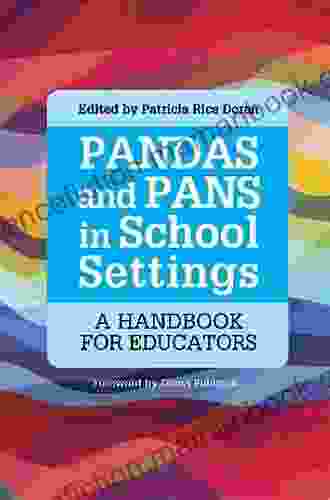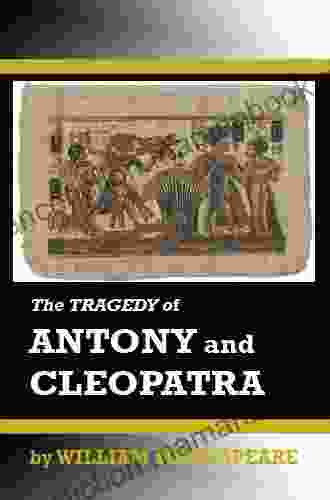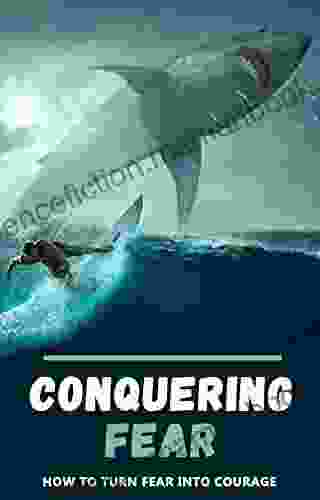The Tragedy of Antony and Cleopatra: A Tale of Love, Power, and Betrayal

The Tragedy of Antony and Cleopatra is a historical play by William Shakespeare, written between 1606 and 1607. It is based on the lives of the Roman triumvir Mark Antony and the Ptolemaic Queen Cleopatra VII of Egypt. The play depicts the tragic love affair between Antony and Cleopatra, their political ambitions, and their eventual downfall.
Plot Summary
4.6 out of 5
| Language | : | English |
| File size | : | 301 KB |
| Text-to-Speech | : | Enabled |
| Screen Reader | : | Supported |
| Enhanced typesetting | : | Enabled |
| Print length | : | 114 pages |
| Lending | : | Enabled |
The play opens in Alexandria, where Antony is reveling with Cleopatra and ignoring his duties as a Roman general. News arrives that his wife, Fulvia, has died, and that his former ally, Octavius Caesar, is threatening to invade Egypt. Despite Cleopatra's pleas, Antony leaves to confront Octavius.
In Rome, Octavius uses Antony's absence to turn public opinion against him. Antony returns to Egypt, where he and Cleopatra plan to defend their kingdom against Octavius' advancing forces. However, Antony is defeated in a naval battle and his army deserts him.
Antony and Cleopatra flee to Alexandria, where they are besieged by Octavius. Antony is mortally wounded in the battle and dies in Cleopatra's arms. Cleopatra, knowing that she will be captured and taken to Rome in triumph, takes her own life by being bitten by an asp.
Characters
- Mark Antony: A Roman triumvir who is infatuated with Cleopatra and neglects his political duties.
- Cleopatra: The Queen of Egypt who is known for her beauty and intelligence.
- Octavius Caesar: Antony's rival and eventual conqueror, who uses propaganda to turn public opinion against him.
- Enobarbus: Antony's loyal friend and general who eventually betrays him.
- Lepidus: A weak and indecisive triumvir who is used by Octavius and Antony.
Themes
- Love and Betrayal: The play explores the themes of love and betrayal through the relationship between Antony and Cleopatra. Antony is torn between his love for Cleopatra and his duty to Rome, while Cleopatra uses her beauty and intelligence to manipulate Antony for her own political gain.
- Power and Ambition: The play also examines the themes of power and ambition. Antony and Cleopatra are both driven by their desire for power, and their ambition ultimately leads to their downfall.
- Fate and Free Will: The play raises questions about the role of fate and free will in human affairs. Antony and Cleopatra's tragic ending seems inevitable, but it is also the result of their own choices.
Style
The Tragedy of Antony and Cleopatra is written in blank verse, a form of unrhymed iambic pentameter. Shakespeare uses vivid imagery, metaphors, and similes to create a rich and poetic text. The play is also notable for its dramatic tension and suspense, as the audience is constantly on the edge of their seats wondering what will happen next.
Historical Context
The Tragedy of Antony and Cleopatra is based on historical events that took place during the late Roman Republic. Antony and Cleopatra were real historical figures, and their love affair and tragic ending were well-known to Shakespeare's audience. However, Shakespeare took some liberties with the historical record in order to create a more dramatic and compelling play.
Critical Reception
The Tragedy of Antony and Cleopatra has been praised by critics for its powerful characters, its dramatic tension, and its poetic language. It is considered one of Shakespeare's greatest tragedies, and it is regularly performed by theater companies around the world.
The Tragedy of Antony and Cleopatra is a classic play that explores the universal themes of love, betrayal, power, ambition, and fate. It is a powerful and moving play that continues to resonate with audiences today.
4.6 out of 5
| Language | : | English |
| File size | : | 301 KB |
| Text-to-Speech | : | Enabled |
| Screen Reader | : | Supported |
| Enhanced typesetting | : | Enabled |
| Print length | : | 114 pages |
| Lending | : | Enabled |
Do you want to contribute by writing guest posts on this blog?
Please contact us and send us a resume of previous articles that you have written.
 Top Book
Top Book Novel
Novel Fiction
Fiction Nonfiction
Nonfiction Literature
Literature Paperback
Paperback Hardcover
Hardcover E-book
E-book Audiobook
Audiobook Bestseller
Bestseller Classic
Classic Mystery
Mystery Thriller
Thriller Romance
Romance Fantasy
Fantasy Science Fiction
Science Fiction Biography
Biography Memoir
Memoir Autobiography
Autobiography Poetry
Poetry Drama
Drama Historical Fiction
Historical Fiction Self-help
Self-help Young Adult
Young Adult Childrens Books
Childrens Books Graphic Novel
Graphic Novel Anthology
Anthology Series
Series Encyclopedia
Encyclopedia Reference
Reference Guidebook
Guidebook Textbook
Textbook Workbook
Workbook Journal
Journal Diary
Diary Manuscript
Manuscript Folio
Folio Pulp Fiction
Pulp Fiction Short Stories
Short Stories Fairy Tales
Fairy Tales Fables
Fables Mythology
Mythology Philosophy
Philosophy Religion
Religion Spirituality
Spirituality Essays
Essays Critique
Critique Commentary
Commentary Glossary
Glossary Bibliography
Bibliography Index
Index Table of Contents
Table of Contents Preface
Preface Introduction
Introduction Foreword
Foreword Afterword
Afterword Appendices
Appendices Annotations
Annotations Footnotes
Footnotes Epilogue
Epilogue Prologue
Prologue Angelee Deodhar
Angelee Deodhar Serena Wolf
Serena Wolf Ee Isherwood
Ee Isherwood Sandy Appleyard
Sandy Appleyard Jennifer Monroe
Jennifer Monroe Edward Willett
Edward Willett Tibor Fischer
Tibor Fischer Michio Kaku
Michio Kaku Daniel Kraus
Daniel Kraus David Stewart
David Stewart Nikos Kazantzakis
Nikos Kazantzakis Juddy Anderson C Punzalan
Juddy Anderson C Punzalan Dean Jobb
Dean Jobb Jonathan Hirshon
Jonathan Hirshon Judd Winick
Judd Winick Cj Lyons
Cj Lyons David Podlipny
David Podlipny Nikki Tajiri
Nikki Tajiri Roxanne Langley
Roxanne Langley Kris T Bethke
Kris T Bethke
Light bulbAdvertise smarter! Our strategic ad space ensures maximum exposure. Reserve your spot today!

 Chance FosterWhy The Origins Of The Achievement Gap Matter For Justice, History, And Our...
Chance FosterWhy The Origins Of The Achievement Gap Matter For Justice, History, And Our... Terry PratchettFollow ·8.9k
Terry PratchettFollow ·8.9k Wesley ReedFollow ·3.6k
Wesley ReedFollow ·3.6k Darius CoxFollow ·14.2k
Darius CoxFollow ·14.2k Ernest J. GainesFollow ·2.1k
Ernest J. GainesFollow ·2.1k Shane BlairFollow ·10.5k
Shane BlairFollow ·10.5k Louis HayesFollow ·10.8k
Louis HayesFollow ·10.8k Rob FosterFollow ·6.3k
Rob FosterFollow ·6.3k Gabriel MistralFollow ·9k
Gabriel MistralFollow ·9k

 Ashton Reed
Ashton ReedClean(ish) Food for People Who Like to Eat Dirty
By: [Your Name] Are...

 Ronald Simmons
Ronald SimmonsThe Handbook for Educators: A Comprehensive Guide to...
The Handbook for...

 Derrick Hughes
Derrick HughesAny Place Hang My Hat: A Hauntingly Beautiful Novel by...
A Masterpiece of...

 Adrien Blair
Adrien BlairFly Me to the Moon Vol. 5: A Lunar Odyssey through...
In the vast...

 William Powell
William PowellTips By Gardeners On Variety Of Subjects
Gardening...
4.6 out of 5
| Language | : | English |
| File size | : | 301 KB |
| Text-to-Speech | : | Enabled |
| Screen Reader | : | Supported |
| Enhanced typesetting | : | Enabled |
| Print length | : | 114 pages |
| Lending | : | Enabled |












